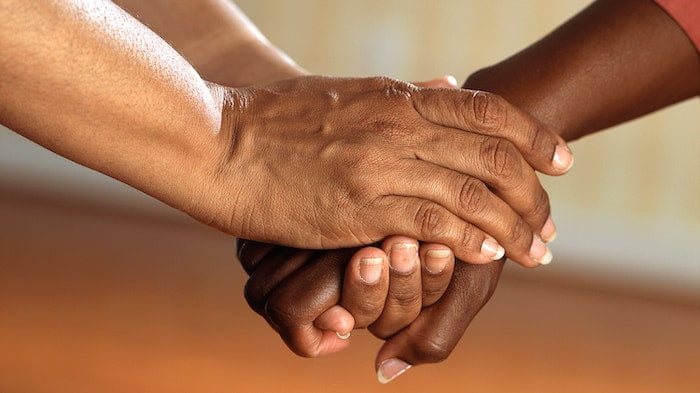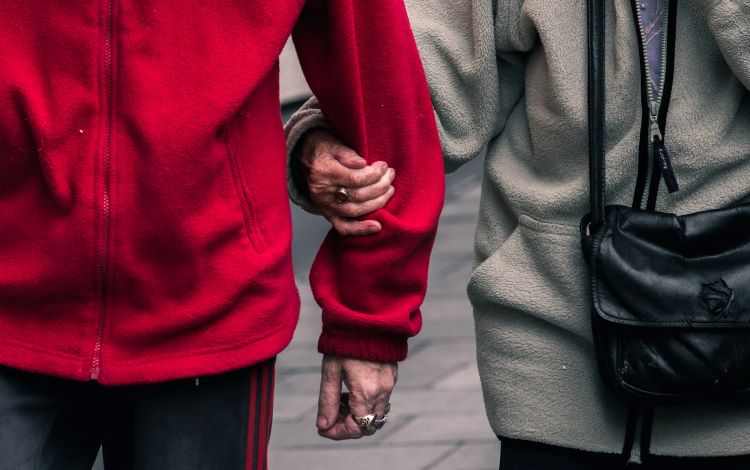How to Stop Being Co-dependent
Co-dependency is characterised by “an emotional and behavioural condition”, the direct opposite of a healthy and equal relationship
This can be a learned behaviour, affecting the ability to have a healthy relationship as the relationships are one-sided and emotionally abusive.
Co-dependency is a form of relationship addiction. It is a way of behaving in a relationship where one individual is prioritised over the other.
This often involves forgetting where one person ends and another begins, as the more one person gets drawn in, the more the other person starts to lean on them.

The term ‘co-dependency’ was originally used at an Alcoholics Anonymous (AA) group meeting to describe the partners of an alcoholic.
The partners of alcoholics were not addicted to alcohol themselves, but are addicted to their partners. People in co-dependent relationships are often subject to a pattern of control, specifically reliance.
It is understood that this form of relationship is primarily caused by a lack of boundaries and self-confidence.
There will be a ‘giver’ and a ‘receiver’ in a co-dependent relationship – givers lose their sense of self and true identity, and as the receiver becomes used to this amount of attention, they are likely to become overly controlling and narcissistic.
There are three elements known to cause this type of relationship:
- Biology: The prefrontal cortex may fail in some individuals to suppress empathic responses. An excess and overload of empathy are likely to cause people to lack personal boundaries as they are too sensitive to the emotions of others.
- Psychology: Some individuals are psychologically predisposed to care a lot for others. This is common in people that have grown up in an abusive community or negligent household.
- Society: A co-dependent relationship may be the result of a shift in societal views regarding relationships. Relationships have drastically changed in the modern world, as women are not merely household wives anymore and have equal rights to men.
Creating a self that is entirely dependent on the mood or situation of someone else is not healthy and can have damaging consequences. If you think this might be you, look for the following signs of co-dependency.
Don’t let co-dependency control your life – call our expert team today on 0800 088 66 86
Signs of Co-dependency

There are five known signs of a co-dependent relationship:
- Low self-esteem
- Compliance
- Control
- Avoidance
- Denial
Here, we will call the ‘givers’ the co-dependents. The co-dependents often minimise or change their feelings and emotions to fit in with the relationship in question.
If the ‘receiver’ is in a bad mood or is struggling, co-dependents will ignore their own issues and focus their entire energy on the other person (receiver).
Whilst this may sound endearing, it is a common sign of a relationship imbalance.
Co-dependents will then seek recognition and words of affirmation for doing what the receiver asks or demands from them. Co-dependents will often have low self-esteem, thinking of themselves as ‘lower’ than the receiver and mistakenly believing that they are lucky to have the receiver.
This will leave the co-dependents unable to ask or challenge the receiver on most things, often finding it difficult to set any sort of boundaries.
Co-dependents are then too loyal, regardless of how toxic the environment may be.
This is a compromise and downgrading of their own values and beliefs in order to keep the relationship going.
Putting your own interests aside completely in order for someone else to gain satisfaction is a concrete sign of co-dependency.

It is common for co-dependents to use sex, gifts, and other forms of pleasure to gain the attention of the other person, or to impress them.
This leaves the co-dependent at a disadvantage.
Always working on someone else means that you cannot work on yourself or develop as a person.
The following are common signs of being a ‘giver’, or the ‘co-dependent’:
- Trying hard to avoid any conflict, and as a result, you are hiding your feelings, emotions, and passions
- Constantly checking in on other people, to the point that their feelings (the receivers’ feelings) will affect how you are feeling
- Feel as though you are always trying to make it up to someone, so you feel like you are walking on eggshells
- Apologising for everything and anything to avoid arguments or looking ‘bad’
- You believe you can change or rescue someone from addiction
- Putting someone else on a pedestal and above yourself and others (idealising someone)
- If someone else is happy, you feel relieved
- Fears of abandonment or rejection
- Taking on more work than you can handle
- Feeling anxious or guilty about doing anything for yourself
This promotes an unhealthy relationship dynamic, one that can easily affect self-worth, confidence, and overall health.
These co-dependent relationships can affect friends, family, lovers, co-workers, and anyone you have an affiliation with.
Think you’ve spotted signs of co-dependency in yourself or a loved one? Get professional help today by calling us on 0800 088 66 86
Common Examples of Co-dependency

Co-dependency can affect any type of relationship, from families to lovers.
In a family, such as a parent-child relationship, a co-dependent relationship may look like this:
- The parent doing everything for their child despite being of an age where they should be independent
- Feeling a sense of purpose or meaning if the parent is fully supporting their child
- Struggling to allow a child to be independent
- Dropping your life to care for a parent or their wants/needs even if they can do it themselves
In romantic relationships, co-dependency can involve:
- Gaslighting
- Investing too much time and energy into a partner
- Making excuses for a partner who is in active addiction
- Self-care and personal passions take a back seat in order to provide for someone else
- Enabling damaging and destructive behaviour
- Not allowing independence in a relationship
Some factors may increase the risk of you being involved in a co-dependent relationship, such as the following:
- Chronic anger
- Lying
- Lack of communication
- Lack of decision-making
- A love for control
- Trouble adjusting to change
- The want to be loved
- Lack of self-love
- Lack of trust in others
- Confusing love for pity or the other way around
- Feeling overly responsible
If you would like to learn more about co-dependency, talk to us on 0800 088 66 86
How to Stop Being Co-dependent

Most individuals in a co-dependent relationship are not likely to know they are co-dependent.
This is why the facts and signs of co-dependency ought to be widely talked about, as the first step in overcoming these relationships is identification.
Identify Qualities of a Healthy Relationship
Learning about co-dependency and what this truly means may be enough for some people to change their behaviour or leave the relationship. However, this can prove to be challenging for those who still believe the future of the relationship is bright.
If this is the case, look at what a healthy relationship looks like.
Despite being slightly different for everyone, healthy relationships all have a similar balance and similar attributes:
- Making time for each other
- Maintenance of independence
- Honesty, loyalty, and being open with one another
- Showing affection
- Equality
- Mutual respect and support
Set Healthy Boundaries

The first step towards breaking out of co-dependency is understanding how it works and what causes it. If this is understood properly, people can begin to work on creating healthier relationships.
Healthy relationships have healthy boundaries. Individuals should be equally supportive but also respect each other’s space and their different interests and passions
A healthy boundary should establish what you are willing to do or not do regarding the relationship.
To help yourself establish your boundaries, spend some time thinking about what matters to you and what you don’t enjoy doing or taking part in. Talk to the other person too and ask them similar questions.
Boundaries prevent other people’s wants, needs, and problems from taking over your life whilst you play an active part in the relationship.
Find these limits, but there is no point in having these boundaries if you do not enforce them.
Enforcing boundaries takes time for both people to put them in place and accept them. It is hard to put a boundary in place if the other person ignores them, so communication about these boundaries is very important.
This process gets easier as time goes on, so try not to feel too guilty about declining requests for specific purposes at the start.
Self-Care

Those in co-dependent relationships commonly suffer from low self-esteem and a lack of confidence. This allows other people to take control and be put on a pedestal. If you had true self-worth and value, it is unlikely that you would be co-dependent.
Self-care relates to both mental and physical health, both tying into each other.
Take some time to think about what makes you happy and what makes you feel better. For example, it is scientifically proven that physical exercise and breathing exercises relieve stress and can improve your mood.
Nutrition, sleep, exercise, and socialising are all key elements for health and happiness. Think to yourself, what is the kind of life I want to live? Am I happy with myself and my life right now?
Spend valuable time doing things that you love to do, and that make you feel passionate.
Most of the negative thoughts and feelings you experience might be self-pressure, exacerbated by society and social norms.
It can be helpful to practice overcoming these thoughts, working to replace them with positive affirmations and realistic thoughts.
Seek Help: Talk to People

Relationships that centre around addiction, whether that be substances or the relationship itself, may require medical attention.
Research has shown that several types of talking therapy and behavioural therapy tend to improve an individual’s quality of life and mindset, helping them to prevent or stop being co-dependent.
There are several forms of group therapy that are designed to help co-dependency.
This mutually supportive group environment provides individuals with the chance to learn about other co-dependent relationships. It also gives a space to provide both positive and negative feedback, along with examples of different coping mechanisms.
Some of these groups may follow a similar structure to 12-step programmes for addiction. Individuals may be educated about the mechanisms that underpin co-dependency, giving them a chance to talk about their relationship addiction.
Here, co-dependents can discuss how they feel about themselves too, such as their self-esteem and confidence.
Family therapy targets co-dependent relationships in a family dynamic. During family therapy, individuals have the opportunity to discuss the dysfunctional patterns of family relationships. Family members may also learn how to recognise these patterns and improve communication between them.
During therapy, family members may raise issues that have never been discussed before. Often, one person and their issues have affected the whole family, such as alcoholism. This changes the entire dynamic of the family, meaning that the family need to recalibrate and communicate with one another.
Cognitive Behavioural Therapy

Cognitive Behavioural Therapy works on the thoughts and deep-rooted causes of behaviour.
For co-dependent relationships, cognitive therapy targets the negative thinking patterns that cause or contribute to co-dependent relationships.
For example, some individuals struggle with being alone or think that they are worth less than their partners. Cognitive therapy works on the roots of these thoughts, sometimes focusing on uncomfortable thoughts.
This type of treatment is likely to look into parts of childhood and the therapist might ask the individual to experience specific emotions in order to understand current behaviour.
The main aim of cognitive behavioural therapy is to create a positive change in behaviour by targeting patterns of negative thoughts.
Co-dependent relationships leave co-dependent persons at risk of ill mental health.
Mental health professionals are well-equipped to help co-dependents break free from their relationship addiction.
To move your life away from the grip of co-dependency, call our expert team today on 0800 088 66 86




